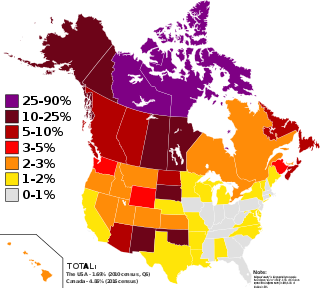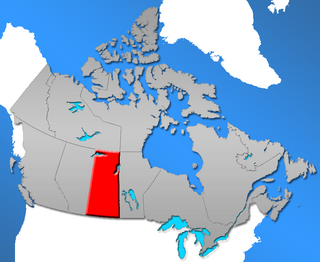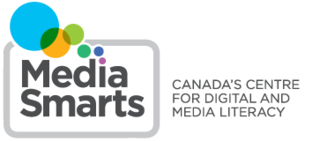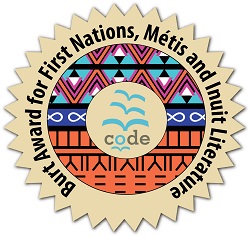Related Research Articles

Indigenous peoples in Canada are the Indigenous peoples within the boundaries of Canada. They comprise the First Nations, Inuit, and Métis, representing roughly 5.0% of the total Canadian population. There are over 600 recognized First Nations governments or bands with distinctive cultures, languages, art, and music.

Adult education, distinct from child education, is a practice in which adults engage in systematic and sustained self-educating activities in order to gain new forms of knowledge, skills, attitudes, or values. It can mean any form of learning adults engage in beyond traditional schooling, encompassing basic literacy to personal fulfillment as a lifelong learner, and to ensure the fulfillment of an individual.

The Assembly of First Nations is an assembly of Canadian First Nations represented by their chiefs. Established in 1982 and modelled on the United Nations General Assembly, it emerged from the National Indian Brotherhood, which dissolved in the late 1970s.
The Early Childhood Education Act is the name of various landmark laws passed by the United States Congress outlining federal programs and funding for childhood education from pre-school through kindergarten. The first such act was introduced in the United States House of Representatives by Congresswoman Patsy Mink of Hawaiʻi in the 1960s. The theory behind the act is that the years before a child reaches kindergarten are the most critical to influence learning. Many children do not have access to early education before entering kindergarten. The goal of the act is to provide a comprehensive set of services for children from birth until they enter kindergarten.
The Education Quality and Accountability Office (EQAO) is a Crown agency of the Government of Ontario in Canada. It was legislated into creation in 1996 in response to recommendations made by the Royal Commission on Learning in February 1995.
Historica Canada is a Canadian charitable organization dedicated to promoting the country's history and citizenship. All of its programs are offered bilingually and reach more than 28 million Canadians annually.

The Australian Council for Educational Research (ACER), established in 1930, is an independent educational research organisation based in Camberwell, Victoria (Melbourne) and with offices in Adelaide, Brisbane, Cyberjaya, Dubai, Jakarta, London, New Delhi, Perth and Sydney. ACER develops and manages a range of testing and assessment services and conducts research and analysis in the education sector.
Nunavut Public Library Services (NPLS) is the public library system serving the citizens of the Canadian territory of Nunavut. The libraries which comprise Nunavut Public Library Services exist in the three administrative regions: Qikiqtaaluk, Kivalliq, and Kitikmeot.

United for Literacy a Canadian literacy organization established in 1899 by Alfred Fitzpatrick. It was founded as the Reading Camp Association and was renamed Frontier College in 1919. In 2022, Frontier College changed its name to United for Literacy.
ECO Canada is an online resource for environmental jobs, certification and training established in 1992 as part of Canada's sector council initiative. Sector councils are organizations that address human resource challenges facing the Canadian economy. With the support of private sector investors and the Government of Canada’s Department of Human Resources and Social Development, ECO Canada works to determine the skills and human resource needs of Canada’s environment industry.
Canada's SchoolNet was a federal educational technology project in partnership with provinces, school boards, non-profit organizations, and the private sector, funded primarily by Industry Canada and developed by Ingenia Communications Corporation to promote the effective use of information and communications technologies (ICT) in libraries and schools across the country. Many important early Canadian ICT programs fell under the SchoolNet umbrella, including Computers for Schools, LibraryNet, First Nations SchoolNet, and Canada's Digital Collections. By 1997, SchoolNet brought internet access to all 433 First Nations schools under federal jurisdiction. Microsoft founder Bill Gates praised the program in the Edmonton Journal on November 26. 1995, stating that "SchoolNet is the leading program in the world in terms of letting kids get out and use computers."

Higher education in Ontario includes postsecondary education and skills training regulated by the Ministry of Colleges and Universities and provided by universities, colleges of applied arts and technology, and private career colleges. The current minister is Jill Dunlop who was appointed in June 2021. The ministry administers laws covering 22 public universities, 24 public colleges, 17 privately funded religious universities, and over 500 private career colleges. 18 of the top 50 research universities in Canada are in Ontario.

Historically, Saskatchewan's higher education system has been "significantly shaped" by demographics. In 1901, six years prior to the 1907 founding of a university in Saskatchewan, the urban population in Saskatchewan was 14,266 (16%) while the rural population was 77,013 (84%). One hundred years later, the proportions had changed significantly: urban population in 2001 was 629,036 (64%) while the rural population was 349,897 (36%). Over time the province's higher education system has changed significantly in response both to this demographic shift and to provincial politics.

Higher education in Alberta refers to the post secondary education system for the province of Alberta. The Ministry of Advanced Education in Alberta oversees educational delivery through universities, publicly funded colleges, technical institutions, and private colleges. These institutions offer a variety of academic and vocational pursuits. Students have access to post-secondary options through most regions of Alberta, and a developed articulation system allows for increased student mobility.
The National Aboriginal Health Organization (NAHO) was an Aboriginal-designed and -controlled not-for-profit body in Canada that worked to influence and advance the health and well-being of Aboriginal Peoples. The organization's funding was eliminated as part of the 2012 Canadian federal budget and NAHO ceased operations on June 30, 2012.
Over the course of centuries, many Indigenous Canadians have played a critical role in shaping the history of Canada. From art and music, to law and government, to sports and war; Indigenous customs and culture have had a strong influences on defining Canadian culture. The Indspire Awards are the annual awards presented by Indspire, formerly the National Aboriginal Achievement Foundation. The awards were first established in 1993 in conjunction with the United Nations declaring the 1990s "International Decade of the World's Indigenous peoples". June 21 is Canada's National Aboriginal Day, in recognition of the cultural contributions made by Canada's indigenous population. The day was first celebrated in 1996 following Governor General of Canada Roméo LeBlanc's proclamation.

According to the latest available data, Statistics Canada estimates 4,157 suicides took place in Canada in 2017, making it the 9th leading cause of death, between Alzheimer's disease (8th) and cirrhosis and other liver diseases (10th). In 2009, there were an estimated 3,890 suicide deaths.

MediaSmarts is a Canadian non-profit organization and registered charity based in Ottawa, Ontario, that focuses on digital and media literacy programs and resources. In particular, the organization promotes critical thinking via educational resources and analyzes the content of various types of mass media.

The Burt Award for First Nations, Inuit and Métis Literature is a Canadian literary award, presented annually to works judged to be the best works of young adult literature published by indigenous writers in Canada. The award is sponsored by the Canadian Organization for Development through Education (CODE), a Canadian charitable organization devoted to literacy and education, and philanthropist William Burt, and administered by the Canada Council. Several other organizations, including the Assembly of First Nations, the Métis National Council, Inuit Tapiriit Kanatami, the National Association of Friendship Centres and the Association of Canadian Publishers, are also involved in the award's administration.

Alberta Education is the Albertan ministry responsible for early childhood education, primary education, and secondary education in Alberta. This is one of the original portfolios in the Government of Alberta: the first Minister of Education was part of the original cabinet in 1905, and that title existed continuously until 1999. The ministry was briefly merged with Alberta Advanced Education to form Alberta Learning from 1999 to 2004, but was recreated under its original name in 2004.
References
- ↑ "Canadian Council on Learning funding cut". Toronto Sun. 2010-01-08. Retrieved 2015-08-27.
- 1 2 "Backgrounder: Canadian Learning Institute". Human Resources and Skills Development Canada. 2002-11-19. Archived from the original on 2011-01-13. Retrieved 2009-11-14.
- ↑ Budget Speech 2003 Radio-Canada.ca. Canadian Broadcasting Corporation (CBC)/Department of Finance Canada, Web. 8 Nov 2009.
- ↑ "When is the Best Time to Study: Day or Night?". 2020-07-18. Retrieved 2024-12-01.
- ↑ Brown, Louise. Arts learning, job training still a priority in Toronto Toronto Star May 28, 2009, Print.
- ↑ Cappon, Paul. Schools - Globe and Mail Feb. 22, 2006, Print.
- ↑ Fitzpatrick, Megan. Canada must follow leaders in lifelong learning: report Financial Post August 2, 2008, Print. (See the article at:
- ↑ "Canadian Council on Learning (CCL) Report: Redefining how success is measured in First Nations, Inuit and Métis learning." LearningWork.ca. December 13, 2007. Web. 8 Nov 2009. <http://www.learningwork.ca/node/244>.
- ↑ "Low literacy levels threaten Canada's economic future: ABC CANADA comments on new report Reading the Future." www.abc-canada.org. 12 June 2008. Web. 9 Nov 2009. <http://www.abc-canada.org/en/reading_the_future Archived 2008-10-26 at the Wayback Machine >.
- ↑ Duerme , Isabelle. "Study: Reading Linked To Better Health." All Headline News February 22, 2008: n. pag. Web. 11 Nov 2009. <http://www.allheadlinenews.com/articles/7010114051>.
- ↑ Rosenfeld, Esther. "Teacher-Librarians Supporting Student Learning." Red Orbit. Sunday, 19 February 2006. Ken Haycock & Associates, Web. 11 Nov 2009. <http://www.redorbit.com/news/education/397057/teacherlibrarians_supporting_student_learning/>.